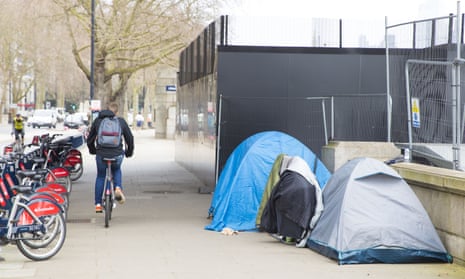Rough sleepers in England can be offered cash and food vouchers if they agree to having a Covid jab, the government has confirmed.
Eddie Hughes, the minister for rough sleeping, said councils could use part of the government’s £28m protect and vaccinate scheme to incentivise vaccinations for those on the streets, in the first scheme of its kind in the UK.
The disclosure, first reported in the Local Government Chronicle, comes amid growing impatience within government circles with people refusing to take up the Covid vaccine offers.
While the UK has one of the highest vaccine uptakes in the world – with more than 85% of adults double-jabbed, according to government data – millions are yet to have a full vaccine course.
The homeless population has been especially hard hit by Covid-19, with one in 50 deaths among this group related to coronavirus in 2020, according to the Office for National Statistics (ONS).
The government’s suggestion of possible incentives was described by Hughes at a ministerial webinar with council leaders and ministers on 17 December.
Speaking after the levelling up secretary, Michael Gove, Hughes said people who slept rough were a group with very low levels of vaccination and there was likely to be a degree of vaccine hesitancy.
“So we’re making an additional pot of money available to incentivise vaccinations for this group. This funding will help local authorities and their partners to use their understanding of the needs of rough sleepers to increase the vaccination take-up.
“Incentivisation will be at the discretion of local authorities but could include transport, subsistence, childcare and support workers’ costs. So I want to be clear, you will have considerable support to do this,” he said.
Reacting to the government’s plans, Andrew Bridgen, the senior Conservative MP for North West Leicestershire, said he would be deeply uncomfortable if it meant a straightforward transaction of cash for a jab.
“I am not sure if that is informed consent,” he said. “It sounds like induced consent. It is like offering food to someone in need and then taking it away if they are vaccine-hesitant. That would be wrong.
“I would not be averse to offering snacks and then discussing the risks of vaccination,” he added. “But any threat of withholding food if they refuse a vaccine is not right.”
Adam Holloway, the Conservative MP for Gravesham, who went undercover in a documentary to expose homelessness in London, welcomed the move. “We have to do everything we can to persuade this group of people to do what they can to get vaccinated,” he said.
“There is a risk because many are drug addicted and have mental health issues. Usually, I would have a problem with giving money to people living on the street.
“But this plan appears to be a good move given that so many are not in good health and are vulnerable to the virus.”
A spokesperson for the Department for Levelling Up, Housing and Communities said: “The discretion given to councils include[s] the ability to offer cash or food vouchers as incentives for vaccination.”
Many people who are homeless or sleeping rough are likely to have underlying health conditions. These are likely to be under-diagnosed or not properly reflected in GP records.
The Joint Committee on Vaccination and Immunisation (JCVI) advised in March that local teams consider a universal offer to adults experiencing homelessness and rough sleeping alongside those in priority group 6. They should also be offered the vaccine without the need for an NHS number or GP registration.
At the webinar, Hughes said the protect and vaccinate scheme was a further development of “Everyone In”, the March 2020 initiative providing safe accommodation for rough sleepers.
“We’ll be building on the success of that programme, which gave us the opportunity to work with people that we haven’t previously been able to reach. Hopefully, this will now allow us to provide accommodation to those particularly vulnerable people, but the pre-eminent element is getting people vaccinated,” he said.
